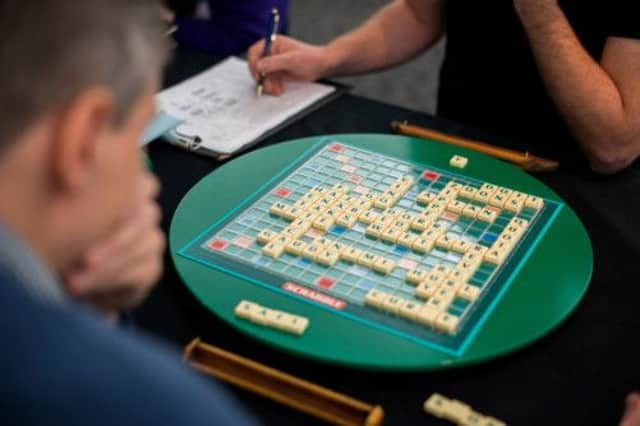Scottish teacher takes UK Scrabble prize


The 42nd National Scrabble Championship yesterday pitted two Scots against each other in a best-of-five showdown.
On one side was Paul Allan, a teacher from Aberdeen, and on the other Allan Simmons, a Scrabble consultant from the village of Coldingham in Berwickshire.
Advertisement
Hide AdAdvertisement
Hide AdMr Allan was eventually declared the winner, sealing victory with the word “bandura”, a Ukrainian lute, which scored 86 points and gave him an unassailable lead in the deciding round.
The last match of the competition, which was held at the Cavendish Conference Centre in London, finished with an overall score of 503 for Mr Allan and 389 for Mr Simmons.
Other high-scoring words in the final included kernite (a mineral) for 100 points, mete (to measure) 34 points, exordial (introductory) 92 points, portage (bridge toll) 76 points and coniines (a poisonous alkaloid found in hemlock) 98 points.
Speaking about his win, Mr Allan, 43, who now who lives in Rushden in Northamptonshire, said: “I am delighted to have won, especially given the fact that the final is played to a public audience of players who expect to be impressed.
“Allan played exceptionally well and was a delight to compete with.”
As well as achieving the ultimate accolade for any Scrabble fan, he also won £2,500 in cash.
It is not the first time he has taken home the trophy; Mr Allan was previously crowned champion in 2007 and has won a number of tournaments since starting to play Scrabble on a competitive level in 1993.
Mr Allan, who also enjoys athletics and juggling, said his love of Scrabble started after his grandmother encouraged him to play the game.
Advertisement
Hide AdAdvertisement
Hide Ad“We would spend hours with the board out – my granny first showed me how to play – but we would never compete against each other.
“She said we would play against the board – our aim was to use all the letters up. If we did, we won, if we failed, the board won,” he explained.
From there, Mr Allan started buying computer games that tested word knowledge. Then he joined a local club and starting competing against other enthusiasts.
However, he said he had also used more traditional methods to improve his vocabulary. “I love dictionaries as well – Chambers and Collins are fantastic,” he said. “But most of your word knowledge is done on a computer, which tests your vocabulary. If you spell the word correctly, it moves on to the next one. Get it wrong, and you go back over it until you get it right.”
Mr Allan, a maths and science teacher, said on average he “reviewed” or checked over about 2,000 words a day to keep his hand in.
“I’m tutoring in the evenings at the moment, which generally leaves my days free to go over words,” he said.
However, people who think the way to Scrabble perfection is to simply swallow a dictionary or read endless novels are sorely mistaken. “Many of the best Scrabble players are mathematicians, scientists and accountants,” the new champion said. “You need to have a logical brain to look at the strategy of the game, working out the probability of your opponent making a certain choice.
“It would be more romantic to presume people just read books, but it is more scientific than that these days.”
Advertisement
Hide AdAdvertisement
Hide AdAsked how he planned to celebrate his win, he said: “I’m going home to have a curry and a beer. I’m very relived it’s over. I feel I can finally relax now – it’s a bit like the feeling after you’ve finished an exam.”
And what does he plan to do with his £2,500 winnings? “I’m buying a television and a piano,” he said.
Mr Allan is also saving up to travel to Prague in December for the debut of the Scrabble Champions Tournament, a new annual competition that brings together top-ranked players and encourages up-and-coming enthusiasts to take part.
How it all started
Scrabble inventor Alfred Butts was an unemployed architect in New York in the 1930s when he began devising a word game using letters printed on small cardboard squares.
He initially called it “Lexiko”, then “It” and then “Criss-Cross”. However, the game went unnoticed until 1948 when fellow American James Brunot thought it might have commercial possibilities. He and his wife began making the game in their home in Connecticut. They settled on the name Scrabble.
However, sales remained sluggish until 1952, when the owner of Macy’s store, who had played the game while on holiday, told the toy department to stock it. Other toy shops followed suit.
Today, more than 150 million games of Scrabble have been sold in 121 countries and 29 languages. If all the tiles ever produced were laid end to end, they would reach eight times round the earth.
In 1995, the Association of British Scrabble Players was taken to court by an irate competitor for allowing too little time to go to the toilet between games.